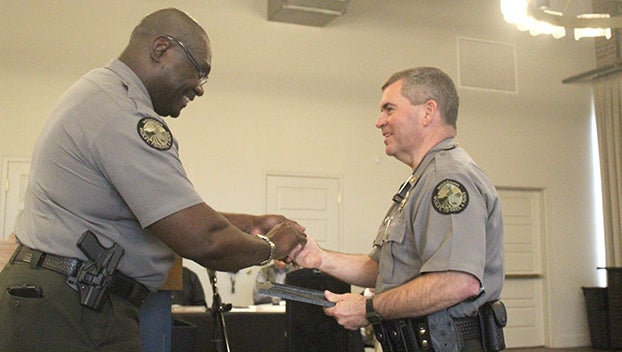Circuit clerk moves records online
Published 7:05 am Sunday, April 5, 2015
Over the past three years, the Lincoln County Circuit Clerk’s office has taken steps to make sure that in events like the fire that destroyed the courthouse in 1893, public records are secure. Circuit Clerk Dustin Bairfield has implemented changes that improve the way Lincoln County’s public records are preserved, accessed and maintained.
Since Bairfield was elected in 2012, he and his team have been in the process of bringing their office into the digital age. After completing some labor-intensive initial phases of digitizing Lincoln County’s records, there are benefits that resident can observe presently, with groundwork laid for even more in the future.
These improvements can be seen in the several categories of documents that the Circuit Clerk’s office deals with on a daily basis.
MARRIAGE RECORDS
All of Lincoln County’s marriage records dating back to 1893 (the year of the courthouse fire) have been indexed and are searchable online. Bairfield said that prior to the indexing, if someone wanted to access a particular record they would have to search manually through the large, bound book containing all marriage licenses from that particular year. One would have to peruse hundreds of pages, sometimes only to find the document had been incorrectly filed.
Now that the documents have been indexed online, Bairfield said, the process of finding a particular record is exponentially faster and more convenient.
Now, anyone can go to the website www.lincolncircuitcourt.com, search the marriage licenses with the name of the bride or groom, and see what page, in what book, the original document can be found.
“It means that you’re able to go online and look this stuff up, and [actually] know where to find it – for free,” Bairfield said. “Whereas some companies charge for that.”
CIVIL and CRIMINAL FILINGS
Bairfield said one of the very first things they started on was the process of going “paperless” on civil and criminal filings. In the case of civil filings, they are generally received through the mail – they are accepted via email, but only after the initial complaint, which is signed – as an enormous stack of paper often inches tall. Bairfield said it is often expensive for someone on the case to ship or make copies of these documents, which can now be accessed online the same day they are filed for $1.
“We call it ‘live scan.’ If you’re here in the courthouse, it’s available [online] in about 3 or 4 seconds and after 6:30 p.m. at home,” he said. “If you’re someone on this case, this would cost $20 to ship it, and we charge $1 online for you to print it at home. Even at our lowest rate, it’s $0.25 cents a page for copies here in the office.
“So its really a win-win for all of us because we’re not tied up at the counter making copies, and you can print it at home,” Bairfield said.
Also, after the documents are scanned, the physical copies are either returned to the sender or shredded – adding extra security.
“[Because] everything that comes in is being scanned, you don’t have to worry about the integrity of the file because you don’t have to worry about someone coming in and looking at this file or taking something out of it,” he said. “Because it is all digitized, it’s all in the system. And everything we have in our system is backed up two ways – one is as a .tiff file and one as a PDF – because technology says one of those [file types] should survive [if anything were to happen].”
Bairfield said the same process is used for criminal cases, meaning that anyone interested in a particular criminal case can access and follow the case online rather than physically viewing the document at the courthouse.
“What’s really [beneficial about that] is regardless of which side of the case you’re on – either the defendant or the prosecution or the family of the defendant or whatever is tying you to this case – you can actually go online and look it up,” Bairfield said.
“For a criminal case, you can follow the chain of events; from the time [the person] was served, to then the booking info being turned in, to the formal arraignment and etc,” he said. “You can see each event as it happens.”





